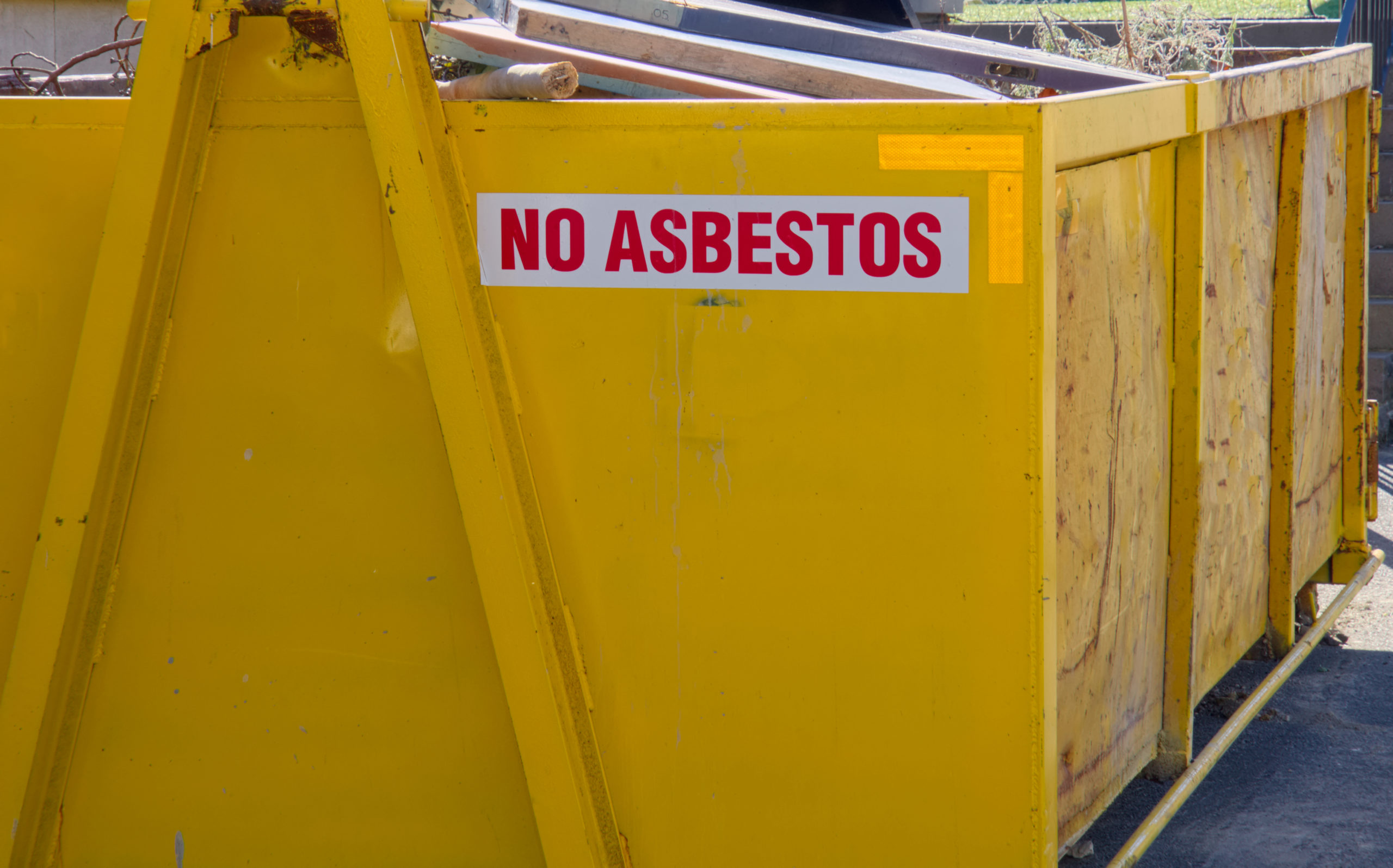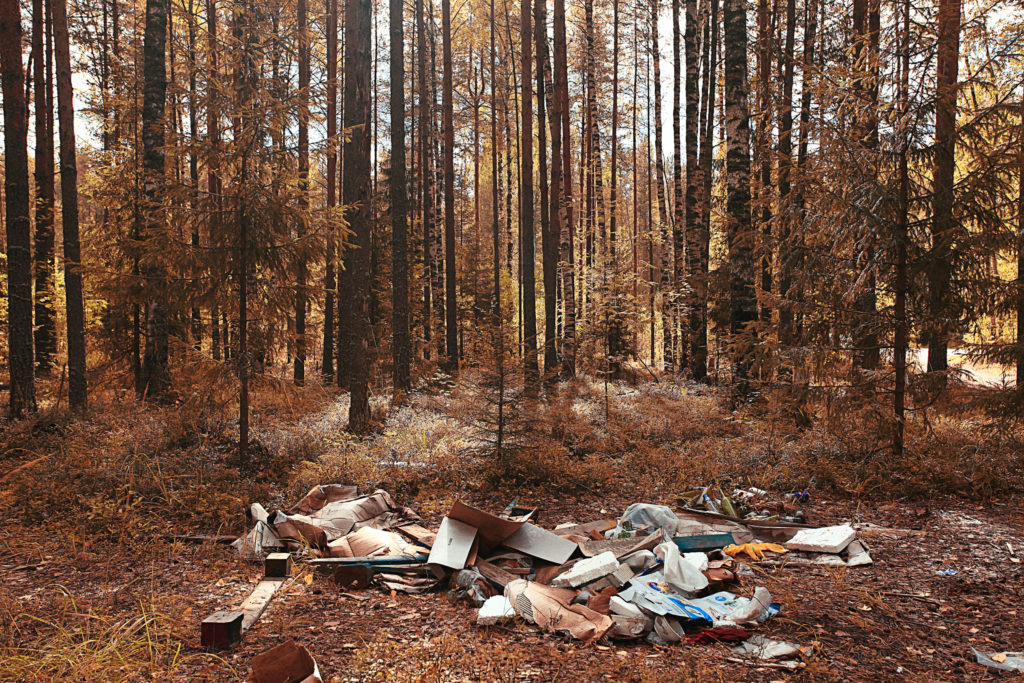Consequences of Illegal Dumping and Littering

A common misconception with dumpster renting is that people assume that with their dumpster (and sometimes with their own waste bins), they can dump whatever they want. However, this is not always the case. No matter the size of the trash bin or dumpster, there are still regulations to follow. Even commercial businesses and factories must comply with the dumping regulations around them. By not following these rules, you are at risk of facing a fine around $50 to as high as $50,000, or even possible jail time.
Before we tell you what the consequences of dumping or littering are and what items you should be careful about dumping, first it is important to understand why these consequences exist in the first place.
For those unaware, being not allowed to throw away certain waste in your own trash can or dumpster may seem more like an inconvenience than anything else. However, the reason why these regulations and fines for dumping the certain materials and substances are in place is because they have a harmful impact on the environment and our health.
For example, dumping batteries with your waste could end up contaminating groundwater. This can affect the water we drink, the food we eat, pollute our air, and ultimately impact our bodies.
These regulations are put in place to protect both our environment and our health, so we can live longer and happier.
With that said, keep these materials and the consequences of dumping them (both for the environment and your wallet) in mind before you throw them away.Here are some items you should be careful about dumping:
Heavy Items
This one focuses mostly on your dumpster rental or junk removal company. Most companies generally have guidelines and regulations about what you can and cannot dump with them. Aside from hazardous materials, which you cannot dump as waste in general, heavy items are regulated to control weight limits, lower fees for filling landfills, and decrease risks from carrying such heavy loads.
If you try to dump over your allowed weight limit, you could end up paying overweight charges, or have your pick-up refused and then charged for wasting the company’s time for not having a prepared dumpster. You will also be charged the rental rate for each day your dumpster stays overfilled.
Transporting waste past a weight limit and left unsecured can also incur serious fees. In the scenario that your dumpster rental pickup truck or junk removal company is pulled over for exceeding weight limits, the client is ticketed or passed on the fees for exceeding the weight limit.
To avoid this, make sure you consult with your dumpster rental company or junk removal company about what materials you want to remove and the best way to go about transporting them, what kind of dumpsters you’ll need and how many, what should be sorted separately, and what you can recycle. Some dumpster rentals also offer certain dumpsters meant for certain materials, that way materials can be dumped or recycled separately, saving costs on overweight fees.
Additionally, heavier loads can cause property damage. Discuss with your dumpster rental company about dumpsters created to handle heavy loads and steps you can take to protecting your property.
Hazardous Materials
As earlier mentioned, dumping hazardous materials can negatively impact our environment, which can come back to affect our health and livelihood.
Hazardous waste is described as anything dangerous or potentially harmful to our health and environment. This includes common items like ink cartridges, cleaning supplies, and batteries.
Some common household items that are or carry hazardous materials are:
- Appliances/Electronics: batteries (car batteries and dry cell batteries), LED and fluorescent light bulbs, computers, computer monitors, hard drives, printers, VCRs, DVRs, cell phones, televisions, microwaves and other appliances or electronic waste.
- Chemicals: drain cleaners, oven cleaners, bleach, lead-based cleaners, solvents, antifreeze, motor oil, transmission fluid, lubricants, gasoline or other fuels, resin, paint, paint thinners, lacquers, wood stains, varnish, metal polish, ink cartridges, nail polish, pesticides, herbicides, bug and pest killers/sprays, fertilizer, pool chemicals, and more.
- Propane tanks, sealed drums, tires, aerosol cans
- Some furniture, like furniture with electronic parts (massage chairs, reclining chairs, and adjustable beds). Some areas don’t allow you to dump your mattress as is and require them to be broken down or recycled.
- Medical needles and medication
- Other contaminated waste or dangerous waste, such as containing asbestos, radioactive waste, and anything that could have absorbed these contaminants.
It’s important to dispose of these items and substances properly because they can contaminate our soil, water, and air if left unresolved. It could negatively impact our environment and the resources we need to survive, and could also harm us directly.
In some states, dumping certain materials can cost you thousands of dollars in fines. If you dumped these items with your dumpster rental service or junk removal company, unless they refuse your load, they could charge you hundreds of dollars since they’ll have to sort through your waste and recycle or dispose of it themselves. In serious cases of illegally dumping in large amounts, illegal dumping can also cost you jail time.
Littering

Some people resort to littering because they don’t want to take further steps when managing their waste. However, when caught, it can bring upon some serious fines. Littering is illegal in all states, and could cost you from as small as a $50 fine to thousands of dollars. In addition to harming our environment, it also creates problems for the local government and could also impact our safety if sharp, choking, or hazardous materials are left uncollected.
To save both time, energy, and money for both you and those who would have to clean up after your mess (literally), here are some alternatives to littering and illegally dumping hazardous materials.
Note that distinguishing between littering and illegal dumping depends on different factors, and those factors could impact you with larger fees or consequences to face.
Recycling
You can’t recycle these in your residential recycling bin, but even for hazardous materials, there are various facilities, companies, and organizations willing to take those items off your hands and recycle them for you.
For example:
Local Recycling Facilities
Many cities have e-waste or hazardous material collection facilities that you can drop your items off at, or they can pick them up. Sometimes these facilities will organize donation drives in your local area, like at schools, parks, or shopping centers. In at least 25 states and in the District of Columbia, there are established statewide electronic waste recycling programs.
Waste Management
To make waste removal easier for you, your local waste management can offer pickup services to recycle or discard waste that can’t be thrown away in your residential bins. You can also mail items to them, to make things more convenient for you.
Stores and Companies
Usually, when you buy a new replacement, the company will offer to recycle your old item for you. This happens with mattresses, cell phones, other electronics, and even ink cartridges. For electronic waste, like batteries, monitors, and cell phones, electronic stores and office supply stores will sometimes collect them. Some stores offer benefits for recycling through them, such as deposits back or credit/discounts off your next purchase.
Auto Repair Shops
Auto repair shops have to recycle automotive waste anyways, so some allow you recycle yours through them. This includes auto fluids, tires, and batteries.
Material Manufacturers
For companies that make materials from recycled goods, you can donate your materials to them directly for them to transform it into something new. For example, tires can be recycled into rubber mulch or asphalt.
Re-sell
If you think your items still have some use left, consider re-selling it. By reselling, you’re recycling the use of your appliances or electronics and gaining a small profit back. Different ways to resell are through garage sales, pawn shops, or selling online.
Donate
If you can’t sell it, consider giving it away to a local charity or group homes so somebody else can use it. For furniture of good to decent quality, the donation could be eligible for a tax write off. With online communities like Facebook Marketplace and Nextdoor, you can also give away your items to your neighbors for free or re-sell it at a discounted price.
Dissolve, Dry, or Breakdown Waste you can’t Recycle.
Some items require following certain procedures before it’s safe to throw them away. For example, some areas allow latex paint and solvents to be thrown away as long as it’s absorbed by something like cat litter or paper in an aluminum pan and left to fully dry before disposing. Make sure you don’t mix fluids and let them dry outside since they can release toxic fumes. While most areas don’t allow paint to be discarded, some places allow paint cans to be recycled as long as it’s thoroughly clean, dried, and free from any residual paint. Other places also allow tires to be thrown in with other waste as long as it’s cut into pieces. Not all areas allow you to do these, so make sure you confirm before you start dumping tire scraps.
While it’s not recommended, if you don’t mind paying overweight fees or additional charges, ask your dumpster rental service or junk removal company if they can still recycle or remove certain items for you. Although rare, some may offer to discard those items for you at an additional cost. If you don’t mind paying those fees, it might be more convenient for you, but consider other options just in case and don’t resort to littering or illegal dumping if they don’t.
When in doubt, it is important to double check with your local waste management, local regulations (city, county, or state), and the junk removal or dumpster rental company you will be utilizing. Doing so can save you from the headache of last-minute figuring out how to handle your waste and prevent paying (unless it’s too late) for the resulting fees or fines.
We can help you find a dumpster rental company near you: